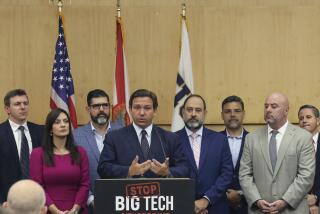Column: A little S.F. personal injury case threatens ‘most important law’ on the Internet
To hear San Francisco lawyer Dawn Hassell tell it, Ava Bird was a nightmare client. Here’s how their dispute could become a nightmare for some of the biggest companies on the Internet — and their users.
Hassell’s law firm signed on to represent Bird in what seems to be a slip-and-fall case in August 2012. According to a lawsuit Hassell eventually filed against her client, the relationship lasted 25 days. During that time, Bird failed to return the firm’s emails and phone calls and missed a key appointment. Finally, Hassell sent Bird a polite email withdrawing from the case and advising her to find another lawyer.
This case has gotten the attention of everyone who’s anyone in the user generated content space.
— Internet law expert Eric Goldman
A few months later, according to Hassell, Bird struck back. She posted a broadside at the online review site Yelp accusing Hassell of making “a bad situation much worse for me,” of “reneging on the case” and of incompetence. Hassell sued Bird for libel and won a judgment for more than $550,000 in damages and costs, as well as an injunction ordering Bird to remove the ostensibly defamatory material from Yelp.
That’s when things got really interesting.
The San Francisco trial judge ordered Yelp, which was not named as a defendant, to remove Bird’s review (along with two other items she was thought to have posted). That order overlooks that Yelp is legally immune from liability for what its users post on its review pages. That’s according to Section 230 of the Communications Decency Act, which protects online publishers that host user comments.
On Aug. 22, a California appeals court upheld the Yelp order. Yelp has appealed the ruling to the state Supreme Court, which is expected to decide shortly whether to hear the case. How seriously do the Internet and publishing communities take a frontal attack on Section 230? Yelp’s appeal to the California Supreme Court has been backed in friend-of-the-court statements by Google, Facebook, Microsoft, Twitter and Pinterest, as well as many smaller websites, a platoon of Internet law professors and 30 online and traditional news organizations, including The Times.
“This case has gotten the attention of everyone who’s anyone in the user-generated content space,” says Eric Goldman, a Santa Clara University law professor who has closely followed the developments on his blog. User generated content — individual reviews, comments, Facebook posts, tweets and more — has become essential to “how modern society communicates,” as the amicus letter from Facebook, Microsoft and Twitter put it. Section 230 ensures that it can’t be driven out of existence by anyone who finds it unpleasant.
Because of the immunity it grants to publishers who act as intermediaries for this flow of information and commentary, “Section 230 is the backbone of the Internet,” says Thomas Burke of Davis Wright Tremaine, Yelp’s appellate lawyer. In the tech community it’s been called “the most important law on the Internet.” But it also has come under concerted attack by plaintiffs who keep looking for loopholes and judges who open them in efforts to scrub distasteful material from the Web. Many Internet experts think Hassell vs. Bird may be the biggest threat to Section 230 yet.
Hassell’s lawyers say the appellate ruling is no big deal. After all, they scoff, Bird’s postings have been ruled defamatory, and there’s hardly any public interest in allowing defamation to remain in the public sphere. But it’s not so simple.
No one would claim that discourse on the Internet is invariably polite, inoffensive or even cogent. Section 230 was enacted in 1996 precisely to focus responsibility for that content on its creators, not its hosts. The idea was to protect online content from the “heckler’s veto,” through which anyone could discourage open discourse by giving Web hosts a legal duty to police users’ comments.
If that were the case, then Web publishers wouldn’t publish anything even remotely negative. That would lead to the “removal of one side of the debate,” argues the advocacy group Public Citizen in its amicus letter. In the case of a review site like Yelp, only positive reviews would survive, destroying the site’s usefulness. It’s true that many websites, including The Times’, regulate users’ contributions and remove potentially offensive material. Under Section 230, that discretion belongs to them, not a judge.
That brings us back to Hassell vs. Bird. There are some odd aspects to this case that magnify fears about its impact. First, it’s not entirely clear that Bird posted all the Yelp reviews Hassell found objectionable; they were anonymous, and one appears to refer to a different case. Bird had replied with a profanity to an email Hassell sent her about the reviews and didn’t respond to the libel lawsuit — possibly because she was no longer living at the address where the court papers were served. Consequently, Hassell won by default. (We couldn’t reach Bird at any of the contacts we had for her from the public record; we also got no reply to our request for comments from Hassell or her attorneys.)
More critically, Yelp was ordered to remove Bird’s comments even though it wasn’t a defendant in the case. Why Hassell didn’t name Yelp as a defendant is unclear. Yelp contends Hassell knew Yelp would fight tooth and nail against her argument that Yelp should be forced to remove defamatory postings. The omission enabled Hassell to ask that Yelp be ordered to remove the postings without giving it a chance to be heard.
Legal experts say that allowing a publisher to be blind-sided in this way simply provides enemies of free speech with a “roadmap” for circumventing 1st Amendment safeguards of all kinds.
“A newspaper can not be ordered to take down an allegedly libelous comment, without having notice and an opportunity to be heard,” observes Eugene Volokh, a UCLA law professor, in an amicus letter on behalf of himself and 12 other law professors. Intermediaries have 1st Amendment rights separate from content creators: “It is why a bookstore cannot be ordered to remove an allegedly obscene book, and an art gallery cannot be ordered to remove an allegedly obscene painting” without a hearing.
Appellate Justice Ignazio J. Ruvalo, writing for Justices Maria P. Rivera and Jon P. Streeter, tried to get around Yelp’s Section 230 immunity by reimagining the relationship between Yelp and Bird. Yelp, he wrote, was not “a publisher of Bird’s speech, but rather … the administrator of the forum” Bird utilized. Burke, Yelp’s lawyer, says that’s just substituting a new term for the old, and doesn’t nullify Yelp’s immunity.
Ripples from the appellate ruling have already appeared. Glassdoor.com, which posts anonymous employee comments about companies to inform job-seekers about working conditions, says the ruling began to show up in letters demanding the removal of comments and disclosure of users’ identities almost immediately after it was handed down.
Internet lawyers say they’re optimistic that the California Supreme Court will toss the appellate ruling, given its own precedent, in which it agreed that in defamation cases that creators of offending material, not Internet service providers, are the only parties who may be “punished and deterred.” But that ruling is 10 years old, Section 230 is still under assault, and as the tech community’s hometown justices, the state Supreme Court could wield outsized influence on the future of the Web. Online publishers are very nervous, and they may have reason to be.
Keep up to date with Michael Hiltzik. Follow @hiltzikm on Twitter, see his Facebook page, or email [email protected].
Return to Michael Hiltzik’s blog.
More to Read
Inside the business of entertainment
The Wide Shot brings you news, analysis and insights on everything from streaming wars to production — and what it all means for the future.
You may occasionally receive promotional content from the Los Angeles Times.











